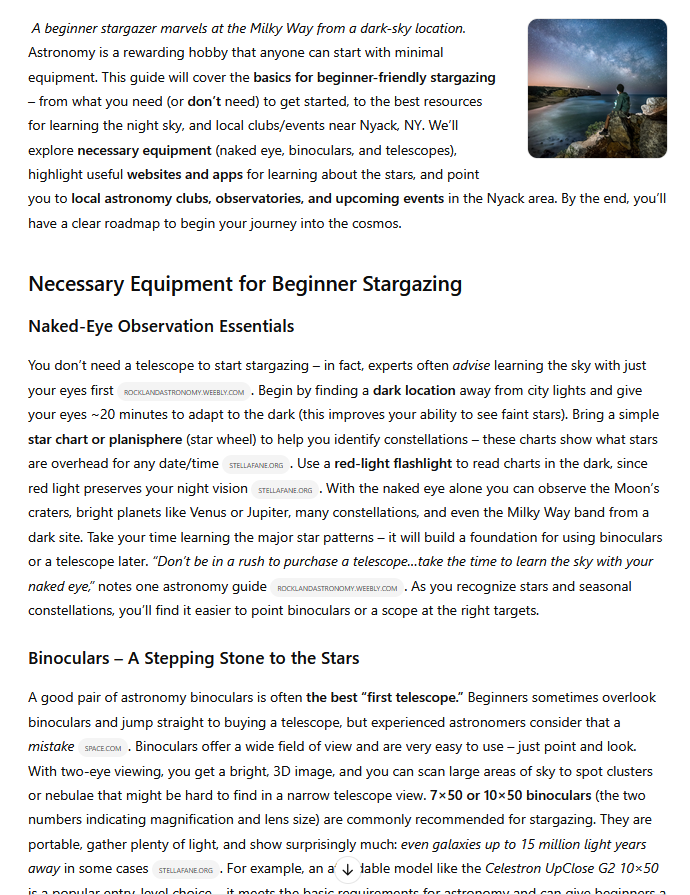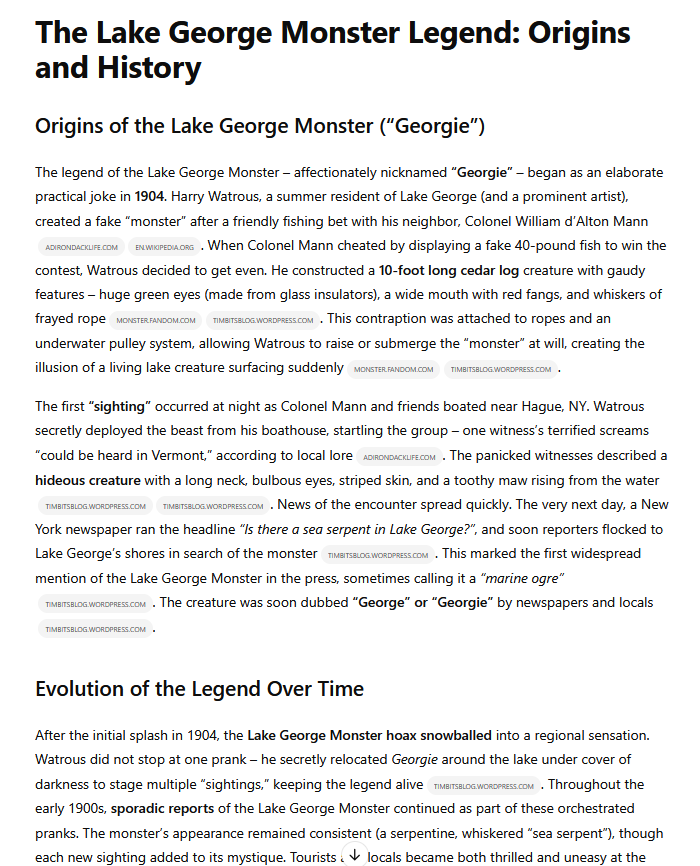I tried Deep Research on ChatGPT, and it’s like a super smart but slightly absent-minded librarian from a children’s book

I have always been the kind of person who gets lost in research. Some people scroll social media before bed; I deep dive into archaeological studies of color use and blogs obsessively chronicling the evolution of old TV shows. When OpenAI pitched ChatGPT's new Deep Research feature, it sounded like a dream companion, capable of autonomously conducting real-time web research and compiling detailed reports.
Deep Research started as an exclusive feature for ChatGPT Pro, the $200 per month subscription service, but is now available to those paying $20 monthly for ChatGPT Pro, though you only get 10 Deep Research queries a week at this level.
At its core, Deep Research is trying to do what I, and probably many others, already do when we have a question too big for a quick search. Usually, researching something means clicking through multiple sources, separating marketing fluff from useful insights, and resisting the urge to fall into unrelated Wikipedia rabbit holes. Deep Research claims to take all that work off your plate, handing you a neatly formatted report instead.
And ChatGPT isn’t the only AI trying to tackle this problem. Perplexity has a feature with the same name and broadly similar goals, as does Google Gemini and DeepSeek. Each system has its quirks, but ChatGPT’s Deep Research, at least in theory, aims for something more structured and thoughtful, a full-fledged report instead of a handful of search results.
I decided to put it to the test with three research challenges I thought might be fun. The reports were impressive, but sometimes a bit wandering. Imagine a brilliant but slightly absent-minded librarian who can find you an obscure 18th-century manuscript in under five minutes and occasionally hands you a 20-volume dissertation when you ask for a little beach reading.
Espresso

I started with a request for help picking out an espresso maker. ChatGPT asked me a few follow-ups about price and other details, leading to this as the final prompt: "Provide a guide to setting up an at-home espresso station for beginners, including recommendations for budget-friendly espresso machines, grinders, and accessories, along with maintenance tips and common beginner mistakes."
A normal ChatGPT response is nearly instant, but Deep Research can take anywhere from five to thirty minutes to return results, depending on how complicated your request is. This took about ten minutes, but Deep Research returned with a very thorough espresso setup guide.
Sign up for breaking news, reviews, opinion, top tech deals, and more.
It covered everything from machine recommendations (the Breville Bambino, Gaggia Classic Pro, and a few others) to grinder options, the importance of fresh beans, and even a brief lesson on coffee extraction. It also included common beginner mistakes like using pre-ground coffee, not weighing shots properly, or ignoring the importance of a good milk frother.
There were quirks. Some of its product recommendations leaned toward pricey options when budget-friendly alternatives existed. But it was a helpful, enthusiastic guide, almost overwhelming in its thoroughness, but I like that.
Star search

For my next request, I went with something I've been thinking about pursuing as a hobby locally, ending up with this prompt: "Provide an overview of beginner-friendly astronomy, including necessary equipment, recommended resources for learning, and local astronomy clubs or events in the Nyack, New York area."
Deep Research delivered an introductory guide to amateur astronomy covering telescopes, binoculars, and the naked eye. It gave some good recommendations for equipment, locations to go to, even websites and apps to plan my nights out, and celestial events to look out for. It also listed nearby astronomy groups and clubs I might join.
Despite being neutral in tone, there was a great deal of enthusiasm baked into the report that I found charming. The equipment suggestions made sense and didn't automatically go for the most expensive choices. Some of the event information it suggested was a little outdated, but that seemed more the fault of the websites that hadn't been updated.
Monster mash

For my last test, I went with something a little less factual to see how the AI handled a report on something that's mainly based on rumors: "Investigate the origins and history of the ‘Lake George Monster’ legend, analyzing its first known mentions, how it evolved over time, and whether there is any real historical basis behind it."
This took the least time, only about five minutes. Maybe a fictional character limited to local legend takes less time to look up. Still, Deep Research returned with a surprisingly detailed breakdown of the Lake George Monster, a local legend in upstate New York. It traced the first major sightings back to the late 19th century, citing old newspaper clippings that described a mysterious serpent-like creature lurking beneath the lake. It explained how the legend was fueled by hoaxes, including a 20th-century prank involving a mechanical sea creature built by a local prankster.
It also attempted to analyze the plausibility of a real creature living in the lake, referencing known aquatic wildlife and scientific skepticism surrounding such myths.
As a report, this was definitely the most fun report to read. It was like a good local historian had written it, complete with source citations and fun anecdotes. It even mentioned other lake monsters, like Champ from Lake Champlain, drawing comparisons between regional folklore. It wasn’t flawless. While it did a great job recounting past sightings and debunked hoaxes, it struggled to clarify which sources were firsthand accounts versus modern retellings. But as a gripping read about a quirky bit of local culture, it was a delight.
Deep thoughts
Deep Research is one of the most ambitious AI tools I’ve tested, and I have to admit, I kind of love it. It feels like having reports from someone else who enjoys exploring through the weeds of research for hidden gems as much as I do. And I will say that, compared to regular ChatGPT answers, it felt like Deep Research made a real effort to find fresh, relevant information.
It's far from flawless, but when it works, it seems to really nail the assignment of making structured, easy-to-read reports that save time and effort. Instead of clicking through endless links, fact-checking articles, and wondering whether a recommendation is actually helpful or just a cleverly disguised ad, you get a report that at least tries to distill everything for you.
I wouldn't trust it to pick a car seat for a child, but I'd at least say it can give me a starting place for my own research. That's the thing about all AI research tools, of course. A librarian, a search engine, or an AI report are no substitute for putting in the work to find and organize information, they help streamline the process sometimes.
However, with the understanding that deep research is not, in fact, actual deep research, it can be a great way to get a head start.
You might also like
- I tried Perplexity’s Deep Research and it doesn't quite live up to ChatGPT's research potential
- I replaced my to-do list with ChatGPT’s Tasks feature and it completely changed the way I plan my life
- Google Gemini adds its personal AI researcher to your iPhone – if you have the right subscription
- I pitted Gemini 2.0 Flash against DeepSeek R1, and you might be surprised by the winner

Eric Hal Schwartz is a freelance writer for TechRadar with more than 15 years of experience covering the intersection of the world and technology. For the last five years, he served as head writer for Voicebot.ai and was on the leading edge of reporting on generative AI and large language models. He's since become an expert on the products of generative AI models, such as OpenAI’s ChatGPT, Anthropic’s Claude, Google Gemini, and every other synthetic media tool. His experience runs the gamut of media, including print, digital, broadcast, and live events. Now, he's continuing to tell the stories people want and need to hear about the rapidly evolving AI space and its impact on their lives. Eric is based in New York City.
You must confirm your public display name before commenting
Please logout and then login again, you will then be prompted to enter your display name.